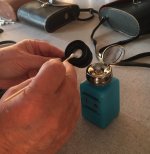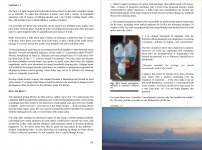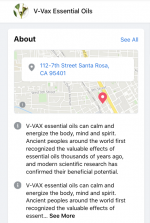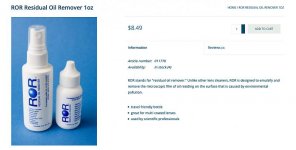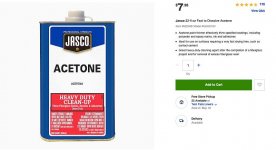WJC
Well-known member
Today, while working in the optics lab aka ... the garage ... a stranger came up and started a conversation—a guy looking through one side of a binocular...on a stand...through an auxiliary telescope...at a large refracting telescope...backwards—can draw people to ask questions. He was wearing a COVID-19 mask, so I decided to let him live. We were having a good conversation until I finished the collimation and started to clean the objectives. When: “What’s that he said?”
When I told him it as acetone, he took it upon himself to save me from myself. You can imagine where the conversation went after that.
The fellow said his was a birdwatcher, although I had never seen him at one of the local club meetings. Although I have spoken about this a bazillion times in as many places, I thought it might be good to do it one more time.
1) I have used enough acetone to fill a large bathtub to overflowing. And I’m still normal ... normal ... normal ...
2) Dr. Gerald Bernstein of Seattle is a cancer specialist who was a pioneer of the Mohs (Frederic E. Mohs-1910-2002) method of surgery in the Seattle area. In querying him, I found that acetone IS NOT a carcinogen and that it is produced in the body. We diabetics produce more of it than the rest of you. NEENER, NEENER!
3) Yes, I know Tele Vue Optics founder and engineer AL Nagler has WRITTEN against using it on optics. That has been to protect the armchair optician from him or herself. Acetone, (CH3)2CO,
molecules are smaller the H2O and it can creep in places where water won’t. Thus, without the knowledge to use it properly, it can seep past the seals around objective lenses and eyepieces on binoculars and can be a very harsh and expensive teacher around telephoto lenses. Considering the constraints he was under, I would offer the same warning.
4) It has been used safely by those cleaning optics (IT IS VERY FLAMMABLE) by tens of thousand of experienced technicians for over 100 years and it is still used today.
5) I have spoken to Al and his son David—now taking a larger role in the business—and when they are speaking to a REAL player DO recommend using acetone. Although at Tele Vue they use the reagent grade chemical, they will tell anyone they feel has the smarts to take it in that the hardware store quality product is absolutely fine!
6) Caveat: Acetone is HYGROSCOPIC and RAPIDLY absorbs moisture from the air. So, if you’re cleaning optics, get a TOUCH on a clean cotton swab (with a wooden applicator), flick off the excess, and swirl gently—starting at the center for no more than 5 to 7 seconds—3 to 5 seconds would be better, discard that swab, and never to use it again. If you use it again, you may grow old trying to clean the mess you just made.
You may use a linear motion if working on prisms.
I rarely tell people about cleaning optics without a few coming out of the woodwork to point out the error of my ways and talk about what a great job that B&L THIS does, Kodak THAT does, or Zeiss SOMETHING ELSE does. And that is fine. I don’t have a dog in the show; a person wanting to clean his optics with clinical-grade horse dung has my blessings.
We have seen many times on this forum that some people profess to know more about optics, binoculars, the human eye, and physiology than any of the available texts. And I believe they absolutely have a right to their opinion. Most of the liquids above will do the job handsomely! A small bottle of most of those cleaners will cost about several times as much as a pint of acetone from the hardware store. :cat:
When I told him it as acetone, he took it upon himself to save me from myself. You can imagine where the conversation went after that.
The fellow said his was a birdwatcher, although I had never seen him at one of the local club meetings. Although I have spoken about this a bazillion times in as many places, I thought it might be good to do it one more time.
1) I have used enough acetone to fill a large bathtub to overflowing. And I’m still normal ... normal ... normal ...
2) Dr. Gerald Bernstein of Seattle is a cancer specialist who was a pioneer of the Mohs (Frederic E. Mohs-1910-2002) method of surgery in the Seattle area. In querying him, I found that acetone IS NOT a carcinogen and that it is produced in the body. We diabetics produce more of it than the rest of you. NEENER, NEENER!
3) Yes, I know Tele Vue Optics founder and engineer AL Nagler has WRITTEN against using it on optics. That has been to protect the armchair optician from him or herself. Acetone, (CH3)2CO,
molecules are smaller the H2O and it can creep in places where water won’t. Thus, without the knowledge to use it properly, it can seep past the seals around objective lenses and eyepieces on binoculars and can be a very harsh and expensive teacher around telephoto lenses. Considering the constraints he was under, I would offer the same warning.
4) It has been used safely by those cleaning optics (IT IS VERY FLAMMABLE) by tens of thousand of experienced technicians for over 100 years and it is still used today.
5) I have spoken to Al and his son David—now taking a larger role in the business—and when they are speaking to a REAL player DO recommend using acetone. Although at Tele Vue they use the reagent grade chemical, they will tell anyone they feel has the smarts to take it in that the hardware store quality product is absolutely fine!
6) Caveat: Acetone is HYGROSCOPIC and RAPIDLY absorbs moisture from the air. So, if you’re cleaning optics, get a TOUCH on a clean cotton swab (with a wooden applicator), flick off the excess, and swirl gently—starting at the center for no more than 5 to 7 seconds—3 to 5 seconds would be better, discard that swab, and never to use it again. If you use it again, you may grow old trying to clean the mess you just made.
You may use a linear motion if working on prisms.
I rarely tell people about cleaning optics without a few coming out of the woodwork to point out the error of my ways and talk about what a great job that B&L THIS does, Kodak THAT does, or Zeiss SOMETHING ELSE does. And that is fine. I don’t have a dog in the show; a person wanting to clean his optics with clinical-grade horse dung has my blessings.
We have seen many times on this forum that some people profess to know more about optics, binoculars, the human eye, and physiology than any of the available texts. And I believe they absolutely have a right to their opinion. Most of the liquids above will do the job handsomely! A small bottle of most of those cleaners will cost about several times as much as a pint of acetone from the hardware store. :cat:
Attachments
Last edited:




